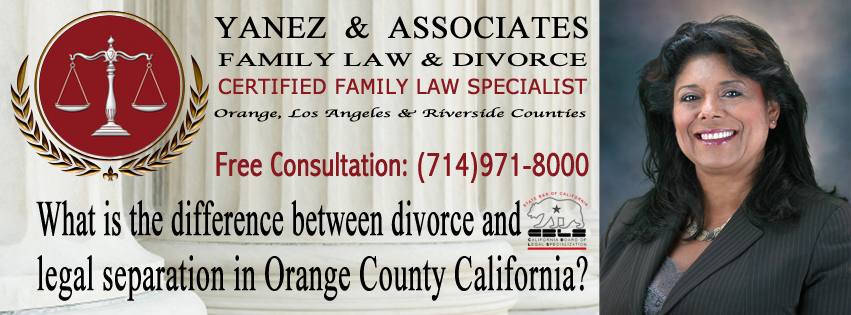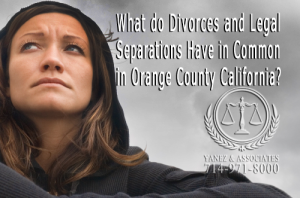FAQ: What is the Difference Between Divorce and Legal Separation in California?
What is the difference between divorce and legal separation in Orange County California?: The main difference between a divorce and a legal separation is that in a divorce, the Court terminates the couple’s marital status, while in a legal separation, the couple remains legally married.
This means that after a divorce, either party is free to remarry or register in a domestic partnership, but the parties cannot share health insurance, or file jointly on their taxes. After a legal separation, the parties cannot remarry, but they can still share health insurance, file taxes jointly and have access to certain other financial benefits of marriage.
In order for a couple to get a legal separation, both parties must agree to the separation. However, because California is a no-fault divorce state, if one party files for divorce the other party cannot stop the divorce from taking place.
Both a divorce and a legal separation involve certain legal processes, like dividing marital debts and assets, spousal support, and the creation of a parenting plan that can include child custody and visitation orders, and child support.
Why Choose a Legal Separation over a Divorce in Orange County California?

What are the reasons a couple might choose to get a legal separation over a divorce in OC or Los Angeles, California?
There are several reasons why a couple might choose to get a legal separation over a divorce in California.
• If a couple is not yet ready for a divorce, a legal separation can be used as a trial separation.
•Some couples have personal or religious reasons for not wanting to get a divorce. A legal separation allows a couple to have most of the benefits of a divorce without actually obtaining one.
• If a couple does not meet the California residency requirements for a divorce, they can move forward with a legal separation until enough time has passed for them to obtain a divorce. The court orders issued during the legal separation can be transferred to the divorce when the couple does file for divorce.
• A couple may have financial reasons for not wanting a divorce. A legal separation allows the partners to share health insurance, or have access to certain government benefits.
In order to get a legal separation, both spouses or partners must agree to the separation. However, one partner or spouse can obtain a divorce even if the other party disagrees.
If a couple is using a legal separation as a trial separation and decides to divorce, or if the couple is obtaining a legal separation now and planning to obtain a divorce once they meet the California residency requirements for a divorce, they need to file an amended petition and request a divorce from the court when they are either ready or eligible for a divorce in California.
What do Divorces and Legal Separations Have in Common in Orange County California?
Both a divorce and a legal separation have similar processes in California, and they both result in many of the same court orders.
In order to obtain either a divorce or a legal separation, a couple needs to either agree on the terms of the divorce, or they need to go through litigation to have a judge set the terms of the divorce. Both processes involve court orders regarding the division of property, the division of debts, spousal or partner support, child custody, child visitation, and child support.
In either a divorce or a legal separation, the couple can choose to create these agreements on their own, through a form of alternative dispute resolution, or through litigation.
The two most common forms of alternative dispute resolution are mediation and collaborative law. Either of these options can work for a couple who is on good terms or is capable of communicating well, and can lead to lower costs, a better long term communication method, and more control over the outcome of the divorce.
OC California Residency Requirements for a Divorce and Residency Requirements for a Legal Separation

What are the OC California Residency Requirements for a Divorce and Residency Requirements for a Legal Separation?
Married Couples
For a married couple to legally divorce in California, one spouse must have lived in the State of California for at least six months, and one spouse must live in the county where you plan to file for divorce for at least three months. If both spouses have lived in California for six months and in different counties for three months, the divorce can be filed in either county.
To get a legal separation In California, at least one spouse must live in California.
If a couple wishes to get a divorce, but does not meet the residency requirements for a divorce, they may file for a legal separation, which will allow them to obtain the necessary orders. Once they do meet the residency requirements for a divorce, the couple can file an amended petition, and ask the court to grant a divorce.
Couples in a Registered Domestic Partnership
If the domestic partnership has been registered in California, there is no residency requirement for obtaining a California divorce. The couple does not need to have ever lived in California.
However, if the domestic partnership has not been registered in California, in order to obtain a divorce, one partner must have lived in California in the past six months, and in the county where the couple plans to file for divorce within the last three months.
If a domestic partnership was registered in California, either partner can file for a legal separation in California, regardless of residency. If the domestic partnership was not registered in California, the couple can only file for a legal separation in California if one partner is currently living in California.
However, keep in mind that in any case, if either party does not live in California, it can be difficult to enforce the court orders regarding partner support, division of property and division of debt. It is important to always discuss your case with an attorney who has experience working with divorce, legal separation and registered domestic partnerships.
A Legal Separation and Divorce Family Law Attorney in the OC
If you have questions regarding the question: "what is the difference between divorce and legal separation" or about filing for a divorce or a legal separation, or if you are ready to file, it is important to discuss your options with a skilled attorney. Contact Yanez & Associates today to set up your free initial consultation.

Contact me to learn more about - the difference between divorce and legal separation and to see which one is best for YOU and your family













